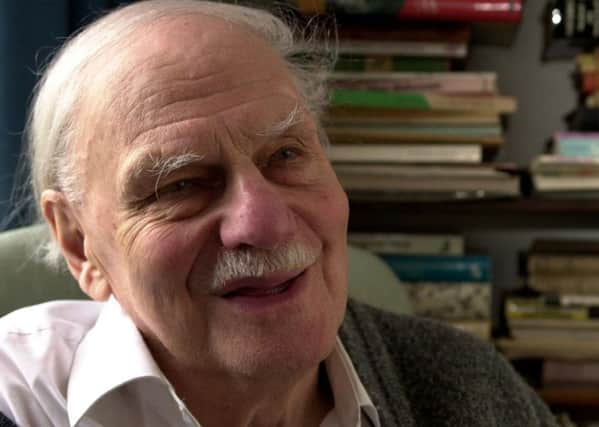Triple celebration for Hamish Henderson centenary


The Gillie Mor, as he was sometimes known, was indeed a lad o’ pairts: the intelligence officer who oversaw the Italian surrender in 1945, who won the Somerset Maugham Prize for his powerfully humane reflections on the war in North Africa, Elegies for the Dead in Cyrenaica, and who refused an OBE in protest at government policy on nuclear weapons. Then there was the tireless collector of songs and stories in berryfields and bender tents, the composer of enduring additions to what he called “the carrying steam” of tradition, such as his heartfelt anthem The Freedom Come-all Ye; and of course the genially presiding lord of misrule at Sandy Bell’s Bar.
Held since the year of Henderson’s death, 2002, Edinburgh Folk Club’s Carrying Stream festival runs from 8-10 November, its opening concert featuring the award-winning band Malinky, singer-songwriter Rab Noakes and the Sangstream Choir, with other events including recitals, workshops, ceilidhs and the annual Hamish Henderson lecture, this year given by Henderson’s daughter, Janet.
Advertisement
Hide AdAdvertisement
Hide AdMalinky’s singer-guitarist Steve Byrne suggests that, without Hamish, there would be no Malinky, such was the strength of the folklorist’s inspirational qualities. Byrne, a trustee of the Hamish Henderson Archive Trust, thinks Henderson’s legacy is being taken more seriously these days: “In the last few years there’s been a real crystallisation and serious revisiting of his impact which I would say is overdue.”
Running concurrently, from 7-10 November in Henderson’s calf country of Blairgowrie and Rattray, the Hamish Matters festival has been established by local poet Jim Macintosh, editor of The Darg, a collection of poetry inspired by the big man. As well as music, poetry and events in schools (a moot point: you’re unlikely to find Henderson’s work on the curriculum), the weekend will also feature a presentation of Hamish Henderson Collected Poems, a new and long-overdue edition edited by Corey Gibson and published by Birlinn.
The Perthshire weekend will see the creation of a 175 metre hillside portrait of Henderson, in jute, on the flank of Ben Gulabin, where Henderson’s ashes were scattered. The work of Martin Guinness, the installation also marks the launch of the Cateran Ecomuseum.
But before either of these two festivals, an extraordinary celebration will be held next Saturday and Sunday at Cultybraggan, the preserved Second World War prisoner of war camp outside Comrie, where Henderson spent a period teaching English to POWs. Folklorist and longtime friend of Henderson, Margaret Bennett (who will also host a ceilidh at the Carrying Stream) has been involved in organising the Cultybraggan event.
Speakers include film-maker and Henderson biographer Timothy Neat and Pino Mereu, poet, musician and founder of the Hamish Henderson Folk Club in Rome, while a “camp concert” – presumably sans guards – will feature an unlikely to be repeated line-up of singers and musicians, all of whom knew Henderson at some stage, including folk revival veterans Adam McNaughtan and Bob Blair, as well as piper James MacDonald Reid, Alison McMorland and Geordie McIntyre, Scott Gardiner and Bennett herself.
It was Henderson who inspired Bennett to become a folklorist, and he was also an influence on her late son Martyn, the ground-breaking piper, composer and producer who created a striking setting for one of Henderson’s poems, “Floret Silva Undique.”
Bennett emphasises her old friend’s importance not just in Scotland but spanning transatlantic folklore studies, and quotes from a letter in which the renowned American ballad researcher Bertrand Bronson assured Henderson: “Posterity’s debt to you is incalculable and will not be forgotten.”
Advertisement
Hide AdAdvertisement
Hide AdSomeone once asked her whether she felt that, as a folklorist, she was walking in Henderson’s shadow. “I replied, ‘Certainly not. I feel that I’m walking in his light.’” Jim Gilchrist
For information and bookings, visit: www.efc1973.com/carrying-stream -festival; www.eventbrite.co.uk/o/hamish-matters-17955520942; www.comrie.org.uk/100yrs-of-hamish-henderson